Impact of Self-awareness and Well-being on Academic Engagement
Aligned with Sreenidhidhi’s strategic goal centered on “wellness,” we firmly acknowledge the intrinsic link between the well-being of students and their academic journey. Our commitment to prioritizing students’ well-being entails the cultivation of crucial elements such as a growth mindset and self-esteem. These foundational aspects not only contribute to students’ overall welfare but are also indispensable for their academic advancement. Recognizing the significance of fostering a growth mindset and encouraging self-esteem simplifies the path towards achieving academic progress. By instilling these values, we create an environment that nurtures not only intellectual growth but also holistic well-being, fostering a harmonious and supportive educational experience for each student.
In the primary year program, the transdisciplinary theme, “Who We Are” serves as an exploration into various facets of individuality, encompassing beliefs, values, personal, physical, mental, social, and spiritual well-being, as well as human relationships within families, friends, communities, and cultures, delving into the essence of being human. Drawing from my experience, initiating the academic year with the transdisciplinary theme “Who We Are” establishes a foundational tone for students throughout the year. In this instance, the focus was on changes during adolescence, guiding students through an inquiry into the physical, mental, and emotional transformations they undergo. Their coping mechanisms emphasized the significance of fostering self-esteem, and resilience and cultivating a growth mindset. Through extensive inquiry using primary and secondary sources, students acquired knowledge about adolescence’s challenging nature, marked by significant physical, emotional, and social changes. Here are some strategies they explored:
Open Communication:
Students developed a habit of communicating openly with trusted adults, such as teachers, parents, guardians, or school counsellors, to seek guidance and support. Engaging in diverse learning activities encourages an approach that is responsive rather than reactive.
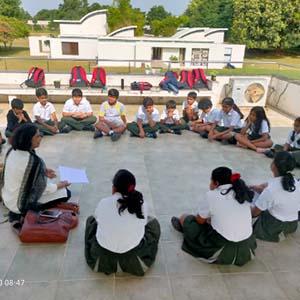
Developing Self-Awareness:
Students heightened self-awareness of physical and emotional imbalances, implementing energizers and mindfulness activities to reduce stress, enhancing focus, and concentration in class, positively impacting their academics.
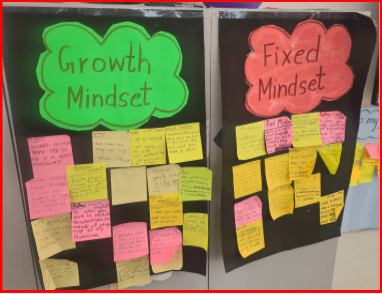
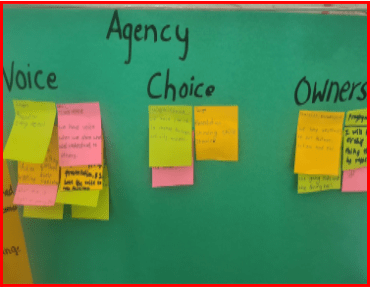
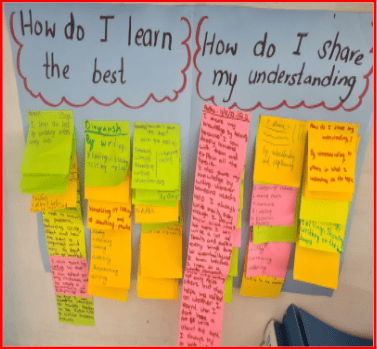

Developing Healthy Habits:
Taking action in the dining hall to minimize food wastage, students recognized the importance of balanced meals, completing their plates, and volunteering to prevent food wastage, contributing to stress management and physical well-being. They visit the library to read for mental well-being.
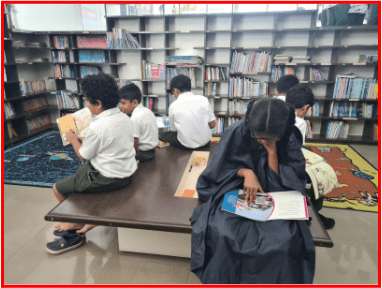
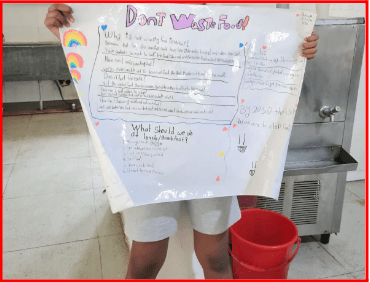
Mindfulness and Relaxation Techniques:
Establishing a routine of practising mindfulness and deep breathing exercises became a habit, aiding stress management and enhancing emotional well-being.
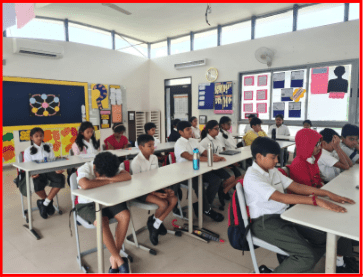

Peer Support:
Understanding the significance of connecting with friends, sharing experiences, and providing mutual support, students fostered a sense of belonging, empathizing and supporting each other during challenging situations, such as reading, writing, and sharing thoughts.
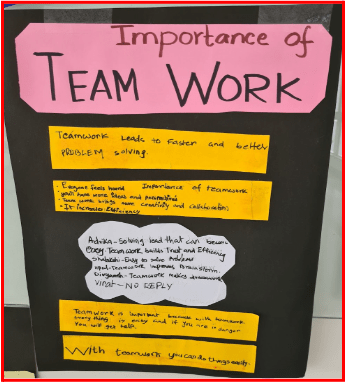
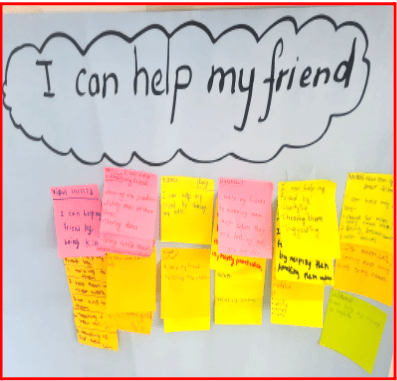
Goal Setting:
Instilling the habit of setting achievable short-term and long-term goals provided motivation and a clear sense of direction, transforming the classroom into a learning centre with self-motivation. The students reflect on their strengths and challenges.
Goal setting by one of the students during the initial days of the academic year
Goals are something that you want to do or achieve and you set a target for it.
My goals for this academic year is I want to become better in my studies have more knowledge about different subjects and also become better in physical education.
My goals in life are I want to make my father and mother proud by getting better and better academically and in all other things I do. I want to be a doctor as I grow as I love human physiology. Also, I want to win swimming competitions like my sister and be like her as she is very good at everything.
I will achieve all this by taking proper steps and putting in my hard work being more responsible towards my studies and doing more hard work and staying more focused and concentrated. Once I decide something I will always strive to do it with all my efforts.
Improvement in Time Management:
Developing effective time management skills to balance academic commitments, extracurricular activities, and personal time emerged as a strategy to reduce stress and enhance productivity. In our classroom, we implement Stephen Covey’s time management matrix, guiding students in prioritizing their tasks effectively.
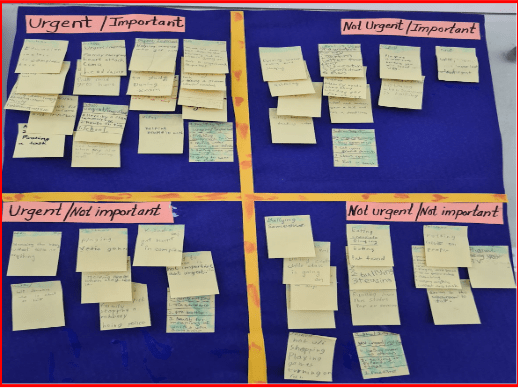
Healthy Relationships:
Students learned to build healthy relationships by communicating effectively and establishing boundaries. Introducing the ladder of feedback -Project Zero, Harvard University facilitated maintaining healthy relationships within peer groups, positively addressing issues through values, clarification, concern, and suggestions throughout the academic year.
Throughout various case studies, the success or failure of a student’s learning process was examined, emphasizing the pivotal roles of self-esteem, motivation, and academic engagement. Academic motivation, acting as an energizing catalyst in the educational context, influences a student’s engagement in learning activities, contributing to both successful learning completion and safeguarding against potential challenges faced by young individuals. This research proposes a conceptual model exploring the positive impact of self-esteem, motivation, and academic engagement on student performance, providing empirical evidence for the interconnectedness of these factors and suggesting strategies to enhance motivation for improved academic outcomes.
By emphasizing the well-being of the students, the classroom turns into a highly motivating environment where students can foster their talents and achieve their academic endeavours. Success or failure in a student’s learning journey encompasses various factors, with pivotal roles played by self-esteem, motivation, and academic engagement. In the educational realm, academic motivation serves as a dynamic force initiating action, recognized as a variable influenced by contextual factors. Academic engagement, synonymous with commitment, propels students to actively participate in educational pursuits, proving critical not only for successful learning but also as a protective shield for the challenges faced by young individuals. This engagement is dissected into emotional, behavioural, and cognitive elements for comprehensive analysis. Understanding how motivation shapes a student’s engagement is vital, reflecting their involvement level in the learning process and subsequently influencing academic advantages. Self-esteem emerges as another influential factor impacting academic performance, closely intertwined with motivation and achievement. It encompasses the positive or negative perception of a student’s self-worth, influencing their ability to fulfil educational tasks. Recognizing that academic success is often gauged solely by grades, this research underscores the psychosocial aspect of self-esteem in shaping grades, intimately linked to academic performance through emotional states and motivation.
Throughout the unit on changes during adolescence, students cultivated self-awareness regarding their physical, mental, social, and emotional transformations, embarking on an introspective journey. This process led them to a deeper understanding of themselves. Drawing on this self-awareness, they seamlessly connected with the task of composing autobiographies. Given their clarity about personal strengths, challenges, emotions, and goals, students independently expressed their thoughts, emotions, and perspectives in their autobiographies. As facilitators, teachers guided the process by providing rules and structural guidance on crafting autobiographical narratives.
The analysis extends beyond conventional evaluations, delving into the profound impact of self-esteem on academic involvement. This research aims to present a conceptual model exploring how self-esteem, motivation, and various components of academic engagement synergistically contribute to a student’s positive performance. By offering empirical evidence on the interplay of self-esteem with the level of student engagement in learning, this study illuminates how these factors collectively manifest in academic accomplishments.
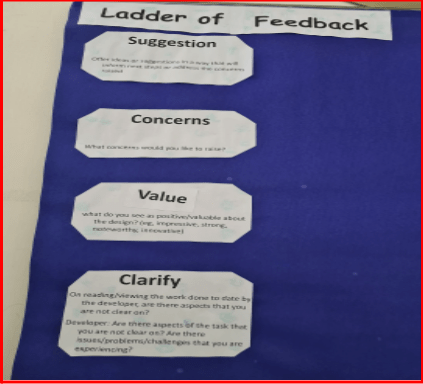
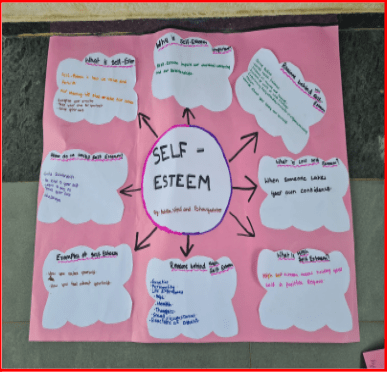
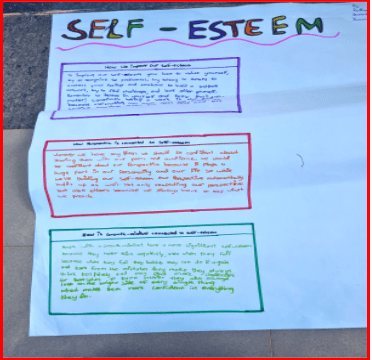
Author Name : Mahua Majumder
